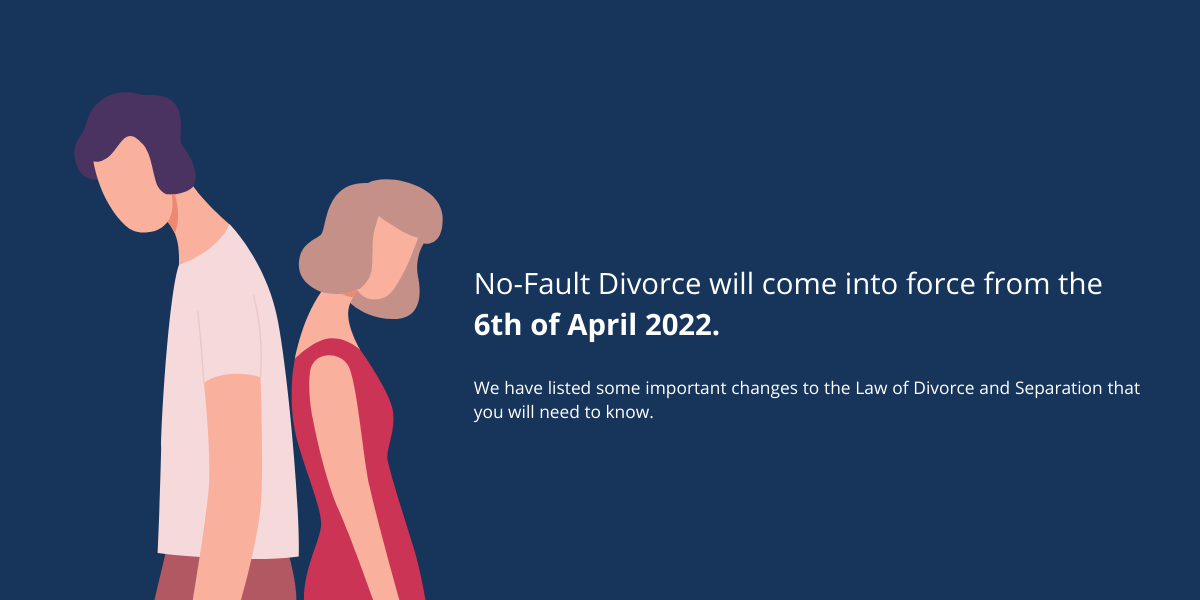From 6th April 2022, all divorces, dissolutions and judicial separations will be subject to new law and new court rules. This is the start of “no-fault” divorce. The new law applies to Civil Partnerships as well as marriages.
THE KEY CHANGES
- The requirement to allege and prove conduct (such as adultery or unreasonable behaviour) or separation grounds has been removed.
- A simple statement of “irretrievable breakdown” is the only basis for a divorce or dissolution.
- There is no ability to defend or cross-petition save for technical reasons such as jurisdiction.
- It is possible for both parties to apply jointly for a divorce or dissolution for the first time.
- There is a new 6 month (26 weeks) minimum timeframe for a divorce or dissolution starting from the date an application is made.
- There is no automatic application for legal costs for a divorce or dissolution, and a separate application (with an additional court fee) must be made for a costs order.
NEW TERMINOLOGY
The new law changes many legal terms which may be familiar to non-lawyers; the key changes are:
- The Petition is now called An Application
- The Petitioner is now The Applicant
- Decree Nisi is now a Conditional Order
- Decree Absolute is now a Final Order
- Judicial Separation Decree is now a Judicial Separation Order
Where there are joint applicants, these are to be called Applicant 1 and Applicant 2, but there will be no difference in status between the two applicants. The responding party to a Sole Application will still be called a Respondent.
WHAT HAS NOT CHANGED
- Sadly, the fee payable to the Court remains at £593.
- An original or certified copy of a marriage or civil partnership certificate is still required before an application can be made.
- A divorce/dissolution application still triggers the Court’s powers to consider separate applications for Financial Remedy orders.
- The new rules still allow for a suspension of making a Final Order (under s.10(2) MCA 1973) until financial issues are resolved.
- It is still possible to seek orders that one party contributes towards the legal costs of the other party (but see above, this attracts another court fee)
There is no change to the advice that a Final Order (formerly Decree Absolute) should never be applied for until after all financial issues have been resolved and recorded in a sealed Order from the Court. Failure to follow this advice could lead to unexpected and unfair financial outcomes.
NEW PROCEDURE
The new law will mean there is a simpler and more straightforward system for ending marriages and civil partnerships. Where one party is represented by a lawyer, the Application must be made via the Court Service online portal. Applications can be Sole or Joint, and the procedure is slightly different depending on whether the Application is a sole or joint one. Paper Applications can be made by post for those without lawyers. All applications for Judicial Separation and Nullity must still be made by post.
SOLE APPLICATIONS
Once an application is lodged with the court, a case number will be allocated, and the Court will serve the respondent party. Rules of “service” remain broadly unchanged. The Application can proceed once the Respondent completes an online acknowledgement form or the Applicant lodges a certificate of service. It is possible to “dispute” an application on minimal grounds, such as a lack of jurisdiction, because neither party has sufficient connection to England and Wales. There is then a 20-week “cooling off” period before the Applicant can apply for a Conditional Order. Following the making of a Conditional Order, there is a further minimum 6-week wait before the Applicant can apply for a Final Order.
JOINT APPLICATIONS
In many ways, these are even more straightforward than sole applications. It may be inappropriate to have a joint application, for example in cases of domestic abuse.
Where either party is legally represented, the application must be made through the Court’s digital service. The parties have to decide how to pay the court fee, but the first Applicant pays the court directly.
On joint applications, there is no requirement of service of the Application. The 20-week cooling off period starts from the date the court issues the Application.
A conditional order can be applied for jointly. However, one Applicant can apply on a sole basis, after which the application ceases to be a joint one and becomes a sole application and the Applicant 2 becomes a Respondent. The application for a conditional order must be sent to the other party.
After a conditional order is made, the same 6-week waiting applies for sole applications. After the 6-weeks, there is either a joint or sole application for a Final Order. The making of the Final Order ends the marriage or civil partnership.
There is no change to the advice that a Final Order (formerly Decree Absolute) should never be applied for until after all financial issues have been resolved and recorded in a sealed Order from the Court. Failure to follow this advice could lead to unexpected and unfair financial outcomes.
NO-FAULT DIVORCE SOLICITORS GUILDFORD
The expert Family Solicitors at Gordons Partnership are here to support you through difficult times. They can advise you on various family-related issues including, no-fault divorce, finances on divorce, children’s arrangements, pre and postnuptial agreements and more. To speak to one of our friendly and efficient family law team, email us at sols@gordonsols.co.uk, make an online enquiry here or call us on 020 7421 9421 (London) or 01483 451900 (Guildford). For more information about no-fault divorce, read this Gordons Partnership article.
